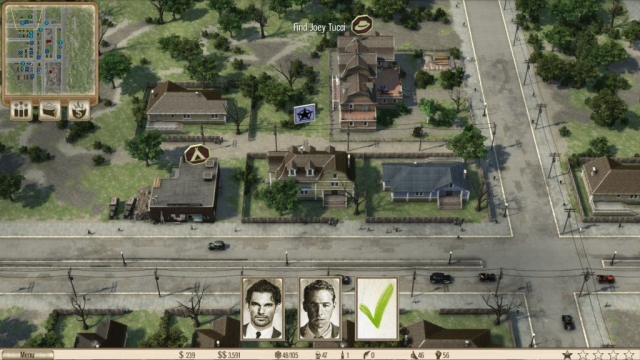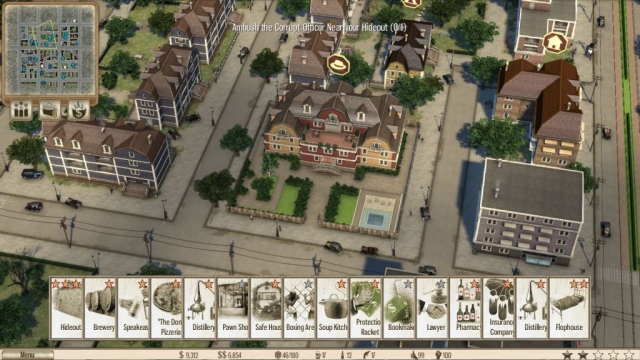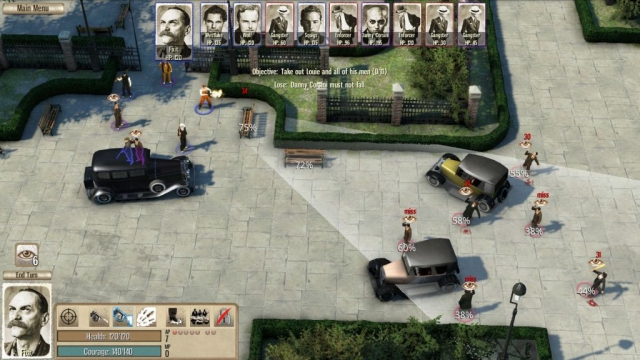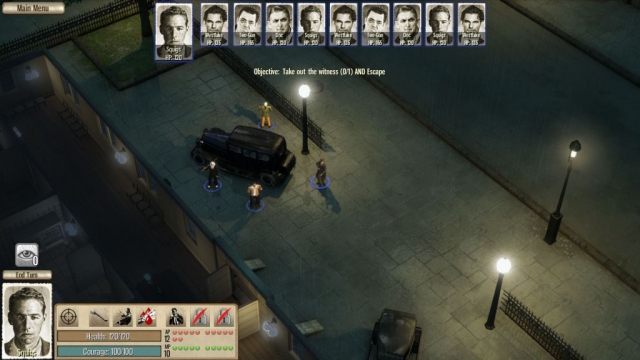Omerta – City of Gangsters Review
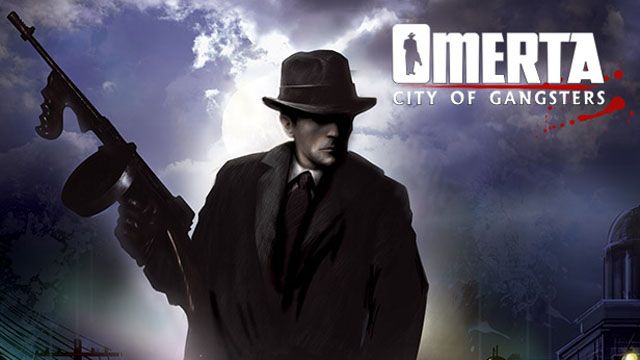
Omerta – City of Gangsters is the latest strategy release from Bulgarian developer Haemimont Games, who is probably best known as the creator of the last two Tropico titles. In Omerta (which means “code of silence”), you take control of a young gangster, and you advance his career until he’s in charge of all of the shady operations in Atlantic City circa 1920. This transition from newbie henchman to big boss is handled in a campaign of 16 missions (rather than as some sort of 4X game), and it features a mix of city management and turn-based combat.
At the start of a game of Omerta, you have to create your character. This is handled through a series of questions about your past, where each answer adjusts your attributes. Attributes include muscle, finesse, toughness, smarts, guts, and cunning, and each one improves some aspect of your game. For example, muscle improves your ability with melee weapons, while toughness gives you more hit points. Your attributes also give you a class. My character was a mastermind (of course!), which allowed him to complete jobs on the city screen more quickly. There are also burglars (who are better at stealing), grifters (who are better at scamming), and more. Sort of oddly (but perhaps accurately), your character has to be male.
The game itself is comprised of two distinct parts. The main part of the game takes place on the city screen, which is where you run your businesses and generate resources. Resources include dirty money, clean money, beer, liquor, and firearms. Businesses include breweries, speakeasies, bookmakers, pizzerias, and more, and if you go upscale, then you can also purchase hotels and casinos. In general, your goal on the city screen is to generate money so you can buy more businesses and generate more money.
As an example, early in a mission you might pay off an informant to learn about business opportunities in your district. This will show you buildings that you can purchase (technically, the game includes renting and buying, but renting only has a one-time cost, and so there isn’t any difference). And so you might buy a brewery to produce beer, buy a speakeasy to sell the beer, and then buy a warehouse so you have room to store your extra beer. Or you might tackle gambling by buying a boxing ring and a bookmaker. There are 28 different types of businesses that you can own.
To help you out in your endeavors, you gain access to several henchmen. Henchmen cost you a daily wage, but they can perform some activities for you. For example, when you buy a business, you have to send a henchman to complete the deal. Henchmen can also firebomb businesses owned by rivals (so they vacate the premises, allowing you to swoop in and buy them), cozy up to politicians so they like you better, and complete “jobs” to sell off your extra resources or buy resources you don’t have enough of.
As you’re playing on the city screen, your businesses and the actions of your henchmen generate “heat,” which is a measure of how close the authorities are to indicting you. An indictment is one of the ways you can lose the game, so you have to be careful with it. Fortunately, you’re given several options for how to reduce heat. You can bribe the police, you can call in a favor from a politician, you can give up a rival gangster, or you can storm the police department and destroy the evidence against you.
Sadly, the city management part of the game is depressingly easy. There are rival gangsters, but they don’t compete against you for resources (you just have a “relations” rating with them, which doesn’t mean much); there isn’t any sort of time limit in any of the missions; and your businesses are guaranteed to make money. That means there isn’t any challenge. Even if you have no idea what you’re doing, at worst you just have to wait a while to generate the resources necessary to buy what you need. Of course, there is a multiplayer mode included in the game (untried by me and ignored by the manual), and it might work better, since then (presumably) you’d have somebody playing against you.
The second part of Omerta involves turn-based combat. This is where you send your henchmen out on assignments to kill people and complete some sort of objective. For example, you might have to defend yourself from the Ku Klux Klan, you might need to rob a bank to pick up some extra money, or you might have to break one of your henchmen out of prison. For each mission, you can send out at most five of your henchmen, with four of them under your control, and one in a support role (the support role changes from mission to mission, and includes things like sending booze to your opponents to get them drunk).
As your henchmen complete missions, they gain levels. For each level, they gain a new perk (a small bonus such as +1 to an attribute or more accuracy with a type of weapon), and at levels 1, 4, and 8 they also gain a talent (an activity they can perform in combat, such as healing an ally). You only control the advancement of the henchmen on your team, but if you hire a new henchman then you’re allowed to respect his build, so he can fit in better with your plan of attack.
The turn-based combat is fairly run-of-the-mill. Characters have actions points, which they can use to make attacks, and movement points, which they can use to move around. Characters also get to use a variety of weapons, including baseball bats, tommy guns, and rifles, and each weapon has various modes of fire. For example, rifles allow you to cripple targets (a good idea when they’re charging at you with a melee weapon), and they also have a standard attack. You can also “aim” a weapon with each attack, which increases accuracy at the cost of an extra action point.
About the only unique part of the combat engine is the courage rating for each character. When characters take damage they lose some courage, and if they run out of courage completely, then they panic, and they lose accuracy with their weapon, and they lose some of their action and movement points. Early in the game this is a serious problem, as panicked characters are almost helpless, but later you get perks and talents that can help manage the problem (such as the Spectacular Criticals perk, which restores some courage after each critical hit).
The turn-based-combat part of Omerta isn’t great, but it at least provides some challenge. That’s because characters aren’t allowed much in the way of reactions, and so even if you have a great ambush site set up, an enemy might be able to run up to you from 30 feet away and then start firing at you with a shotgun from point blank range, all while your characters stand around waiting for their turn. But luckily, the game autosaves just before every combat mission, and so if things go badly, you can just try again. There is also an “auto resolve” option if you’d rather skip the mission, but it’s generally pessimistic and not a good idea.
Overall, Omerta – City of Gangsters is a rather lackluster game. It captures Prohibition and the Roaring 20’s pretty well, but it falls into the trap of many hybrids where it tries to combine basic versions of two genres with the hope that the mix will be something more — when the reality is that basic + basic = basic. I spent over 20 hours playing the 16-mission campaign included with the game, and while I didn’t hate it, I don’t see much to recommend about it, either. Omerta is the sort of game where if you want to play it at all, you should wait for it to drop well below the $40 price where it is now.
Reviewed By: Steven Carter
Publisher: Kalypso Media
Rating: 67%
——————————————————————————–
This review is based on a digital copy of Omerta – City of Gangsters for the PC provided by Kalypso Media.
 Game Over Online
Game Over Online